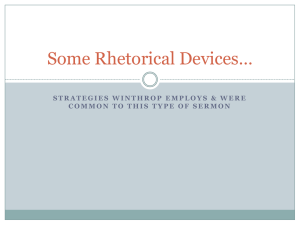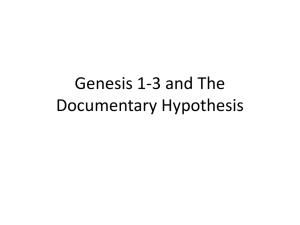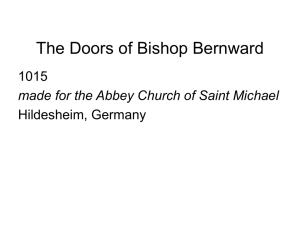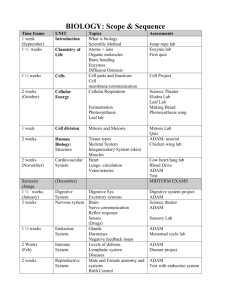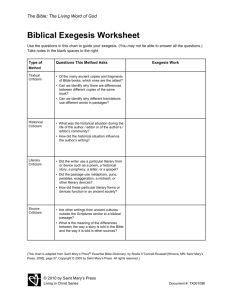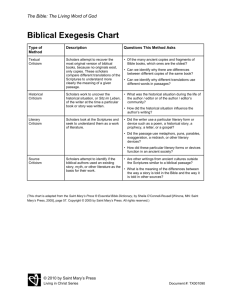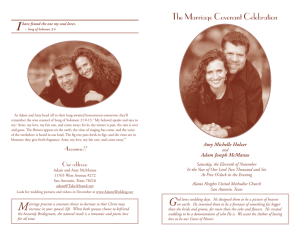lesson two - divine intentions
advertisement
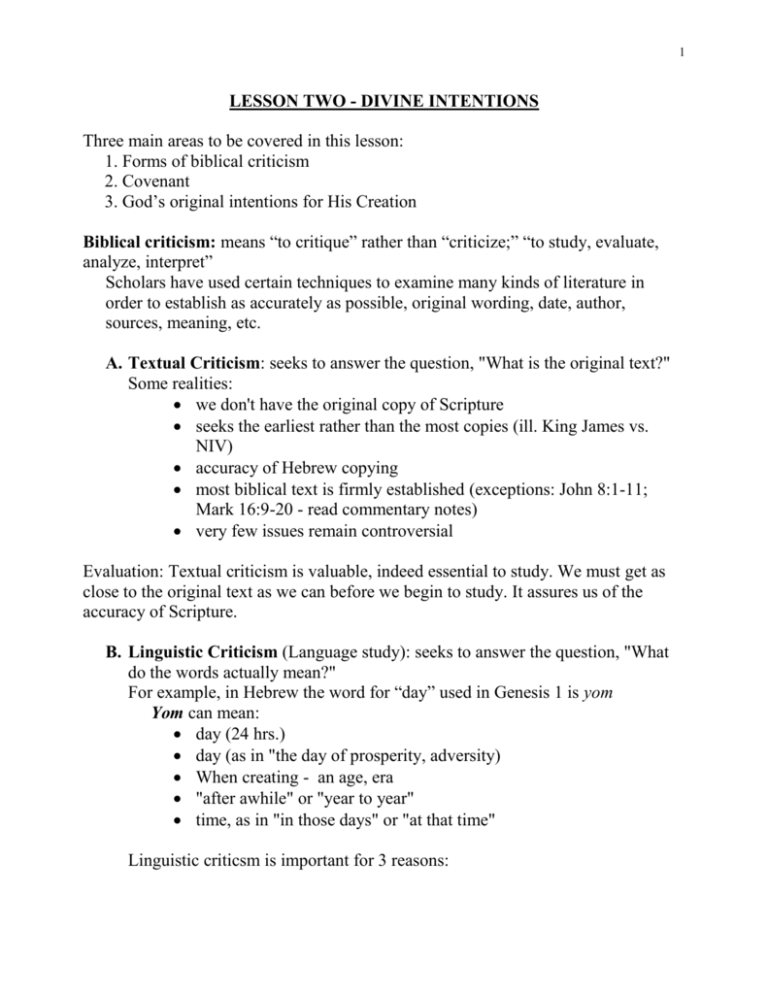
1 LESSON TWO - DIVINE INTENTIONS Three main areas to be covered in this lesson: 1. Forms of biblical criticism 2. Covenant 3. God’s original intentions for His Creation Biblical criticism: means “to critique” rather than “criticize;” “to study, evaluate, analyze, interpret” Scholars have used certain techniques to examine many kinds of literature in order to establish as accurately as possible, original wording, date, author, sources, meaning, etc. A. Textual Criticism: seeks to answer the question, "What is the original text?" Some realities: we don't have the original copy of Scripture seeks the earliest rather than the most copies (ill. King James vs. NIV) accuracy of Hebrew copying most biblical text is firmly established (exceptions: John 8:1-11; Mark 16:9-20 - read commentary notes) very few issues remain controversial Evaluation: Textual criticism is valuable, indeed essential to study. We must get as close to the original text as we can before we begin to study. It assures us of the accuracy of Scripture. B. Linguistic Criticism (Language study): seeks to answer the question, "What do the words actually mean?" For example, in Hebrew the word for “day” used in Genesis 1 is yom Yom can mean: day (24 hrs.) day (as in "the day of prosperity, adversity) When creating - an age, era "after awhile" or "year to year" time, as in "in those days" or "at that time" Linguistic criticsm is important for 3 reasons: 2 1. Language changes. The language of the King James Version and Shakespeare is not the language of the 20th century. It is not good or bad language; it is understood or misunderstood language. E.g. Lord's Prayer: sins, debts, trespasses Means "sins", but "debts" gives sense of something owed, "trespasses" means walking on my turf. Which is best? It depends on the culture and context. That's linguistic criticism. 2. Understand historical idioms E.g: African-American English (Motown – Detroit area): "oreo" is not only a cookie – refers to a person who is black on the outside, white on the inside. Some Hebrew idioms: "dog"- homosexual, or Gentile "cows of Bashan"- fat women living in luxury, self indulgence Euphemisms: "sleep" = death. (1 Cor.15:51 - "We will not all sleep...") "knew her"- sexual relations 3. The meanings of words develop as God gives progressive revelation. Eg. "Hades": a place where everyone goes and is permanent > wicked only, and permanent > wicked and temporary, till resurrection > judgement and then "yehena" or hell > Linguistic Criticism asks "What is the precise meaning of the language in the day it was written?" We need to understand what the language means both to the original hearers, and to the people of this day. C. Literary Criticism: seeks to answer the questions: What is the authorship, date, place of writing, intended recipients, style and purpose of writing of each of the biblical books. (Go to page 17 (1st pg of lesson 2 in Bethel notes to follow along) 3 This lesson looks at some literary styles or media used in the Bible. Each literary style has a specific purpose – it is used to enhance communicating a message: 1. Historical reporting of an event in prose: Lk. 2:1-7: You could have cut it out of last night's newspaper. It answers the questions who, what, when, where, how, with very little emotion. Sometimes you wish for more emotion as in Gen. 22:7-14, Abraham preparing to sacrifice Isaac - no emotion! 2. Historical event in poetic media Judges 5:15b-23: Gives the facts: four tribes, once they were settled in their allotted land wouldn't help the other eight tribes conquor the remaining land, and gives the emotion of the event: these tribes are jerks and cowards. 3. Personification: Personification is the assigning of human qualities and characteristics to non-human or supra-human entities, so that humans can better relate to the idea or event. Isa. 55:12: Do mountains have vocal chords? Do trees have hands? What is being communicated? The event is so big that all of creation responds. Does God have arms or hands? No, he is Spirit (Jn. 4) – but he acts, embraces us, fights for us as if he did. 4. Historical allusion through fable: Judges 9:8-15: Are we dealing with historical facts? Yes! The issue is: "Should we have a king over us like all the other nations or not?" The message is clear: if you get a king, especially an unrighteous king, it's going to be like planting a bramble bush in your garden (he'll strangle you), or like a fire devouring those he rules. The warning was fulfilled in Solomon’s reign, even a just and wise king. He taxed his people, started forced conscription in the army, took slaves to build his cities. The message is, "Human kings are bad news. You have but one king - Yahweh." Parables are similar in form, communicating a clear message using people rather than animals as main characters. The point is: are they true? Are they the Word of God? Definitely! People have said: "The Bible is just a bunch of parables." The Bible contains parables, but no one confuses the medium with the message. The Kingdom of God is not a tree, it is like a tree.) 4 The message is the Word of God whether it comes in parable, prose or personification, just like bibles are bibles whether they come by bus, plane or car. 5. Allegory: A literary or dramatic representation where the apparent superficial story parallels and illustrates a deeper spiritual truth. Ps. 80:8 -15: Symbolic language, picture language - an event plus emotion, still is historical. Question the Psalmist is asking is, "If you went to all the trouble to bring us out of Egypt, why are we now left defenseless here, God?" 6. Imagery or Symbolism Eccl.12:1-7: A fantastic picture of people getting old: life is failing, "get it right with God before it's too late" Honest effort to distinguish between the different types of expression used by the Bible writers will prevent us from: Reducing the Bible’s message to a wooden literalism and thereby conveying distortions of the truth Forcing the Bible to say things which it is not designed to say Being preoccupied with the details of a story rather than with the message cradled within it. Students read example page 19: ask the lesson’s questions (slide) Covenant: To this point (Gen. 1) God is called Elohim, the creator God. In Gen. 2 & 3 God is called Yahweh Elohim, God in relation to His people, a personal, relational God. Yahweh:"I am who I reveal myself to be." Understanding “Covenant” is significant in understanding how God relates to us, his people. There are a number of covenants instituted by God in the Old and New Testaments. What is a covenant and how does it differ from our modern day contracts? Every divine-human covenant in Scripture involves conditions - a commitment to maintain a particular relationship or follow a stipulated course of action. 5 It is not just a legal document, but is a binding agreement between two parties, uniting people in mutual obligation. It is very natural that God's relationship to people be couched in these terms. 1. Biblical covenants are sovereignly instituted by God the Creator and ruler: They are not covenants between equals They are instituted by the greater party (God) There is no negotiation The lesser party (us) can only accept or reject the covenant 2. Biblical covenants have conditions/responsibilities attached A covenant in Scripture is always a "relationship with conditions" – "If you do this, I will do that" or "If you do that I will do this". God's covenant did not begin with Abraham or Moses after the Fall; it began before the Fall, with Adam and Eve. It is always central to the relationship between the Creator and His creation, between God and us. In Gen. 2, where relationships are emphasized, we are introduced to two parties: the greater one first: the Lord God (vs. 4 -6) the lesser one second: man (v. 7) The relationship is defined by the greater one: God says, "I will take care of you in paradise" (v. 8 -14) God says, "You will be obedient" (v. 15 -17) Conditions are defined: If you obey, you will have life (v. 9) If you don't, you will die (v.17) Everything is very clear, very gracious, very good. Adam understands the conditions and abides by them - for a time. The result? Adam and Eve are living within God's divine intentions. 6 Lesson 2 - Divine Intentions God intended for us to live in a world of perfect harmony. Try to imagine what this would be like: A. Harmony with God - perfect fellowship with God Hebrew: El penne means “face to face” - a picture of God’s desire for relationship with us Could communicate perfectly with God No trouble hearing or sensing His presence God and Adam walking and talking together in the garden Sharing activities together, e.g. naming animals Adam praising God continually He had no doubt that God loved him B. Harmony with himself Imagine life with no guilt no worry or anxiety no fear no depression or despair positive self- image sense of purpose, meaning perfect innocence – no awareness or experience of evil Because of perfect harmony with God, man was at peace with himself. C. Harmony with others God created us for fellowship, thus Adam’s desire for a partner. Our basic needs are met in our relationship with God, but Adam’s solitariness was the first place in God's creative work where He declares something "Not good" (Gen. 2:18). We need someone to share our heart with, our innermost feelings and thoughts. Not a superficial relationship, but one with depth, a friend we know really understands what we share, and one whom we can understand as well, a kindred spirit. Adam was united to his wife - one flesh. Their “oneness” was more than just physical, although that's a part of it. 7 Woman was created to stand beside man. She is a “type” of the Holy Spirit sent to stand beside us. The Holy Spirit is feminine in some parts of Proverbs - both are to comfort, counsel. D. Harmony with nature Vegetarians: no antagonism between humans and animals No weeds: the garden produced bountifully for Adam and Eve to use Their responsibilities were to “dress, till, and keep” creation; to help nature produce, to protect it for God's purposes No storms, or natural disasters. Nature was a friend, not an adversary All of this blessing was contingent on people's obedience. God’s covenant conditions were clear: God doesn't always explain why there's an element of trust. E. Obedience was possible We were not destined to sin Adam and Eve had total fellowship with God, relationship that fulfilled both need and desire Adam and Eve (“mankind/humanity”) was made in the fullness of God's image, therefore They/we are fully capable of making moral choices Their obedience was a choice between life and death. This is Paradise, a theme recurrent in Scripture. The human story begins here, and this is what God will restore when Jesus returns! (Is. 11:6- 9; 61:1- 3; Mic. 4:2- 4; Ezek. 36:35; Isaiah 9:6-7; Lk. 4:18 -19). We were made for this, and this is what we long for!

